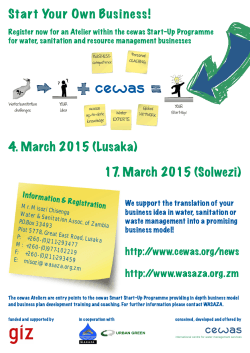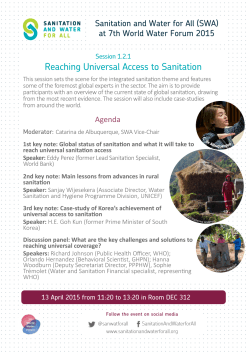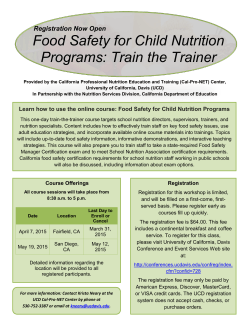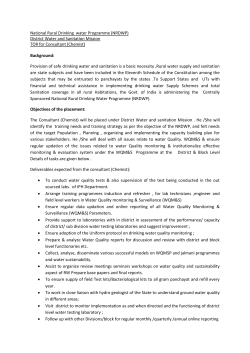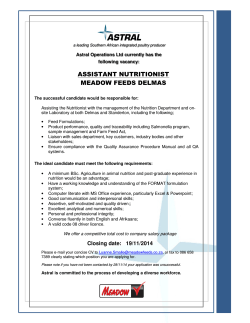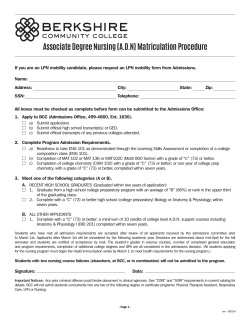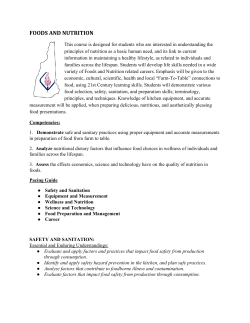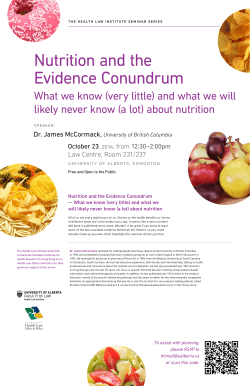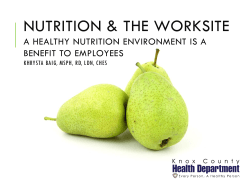
EoI BCC - Nutrition Society of Nigeria
Terms of Reference Terms of Reference (ToR) for hiring of a consulting Services Provider on Behavior Change Campaigns for Nutrition Promotion, Hand Washing with Soap and uptake of Latrine use 1. Assignment Background SNV is a not-for-profit international development organization headquartered in the Netherlands. SNV has been involved in the development sector since 1965. Its core business involves working with local partners to provide technical expertise in Water, Sanitation and Hygiene (WASH), Agriculture, and Renewable Energy sectors. To achieve impact at scale, SNV through its programmatic approach works with local partners to build around a strategic framework of local and international priorities ensuring a shared understanding of the required change is embraced and roles are defined with governments, private sector and civil society. Within these programs, SNV implements various projects across Asia, Africa and Latin America. In Zambia, a number of projects are being implemented. Among these are the Sustainable Nutrition for All (SN4A) and Sustainable Sanitation and Hygiene for All (SSH4A) Results projects. SNV intends to engage a consultant that will develop a need based BCC strategy, plan effective and innovative core messages, tools and materials; and provide a road map on implementation and monitoring of BCC activities in these two projects. This assignment has two components as described below. 2. Component 1: SSH4A Project 2.1 Project Background SNV Zambia is among other 9 countries implementing a 4 year DFID funded SSH4A Results Programme. The program’s goal is to improve access to sanitation and promote good hygiene practices especially Hand Washing with Soap. The key results that will be achieved through the SSH4A Results Programme in Zambia include: - 230 000 will gain access and use improved sanitation by end 2015 250,000 will be reached through sanitation and hygiene promotion activities by end 2015. Whilst demand creation for sanitation has led to promising progress in rural sanitation, it has led to relatively less attention being paid to hygienic behavior and questions are emerging around sustainability. Accordingly SNV seeks to overcome these challenges through the SSH4A Approach which combines work on demand creation, sanitation supply chains, hygiene behavioral change communication (BCC) and governance. The approach recognizes that Sustainable sanitation and hygiene is first and foremost about behavioral change hence demand creation usually starts. However, once demand is created, affordable hardware solutions (local or purchased) needs to be in place so that people are able to act upon their newly defined priority. There is need to innovate hygiene promotion practice, linking this to the sanitation drive, but also embedding this practice in long term health promotion hence the need to have a long term strategy to sustain sanitation and hygiene behavior change, as opposed to one-off triggering & ODF programmes. The baseline survey on sanitation and hygiene survey conducted by SNV in August 2014, revealed that hand washing with soap in the rural wards of Kasama, Mungwi, and Luwingu and Mporokoso districts is at 0.75% whilst access to sanitation is at 35%. This has resulted in the areas recording high incidences of diarrheal diseases. 1|5Pa ge s The Behavior Change and Communications (BCC) component encourages health-promoting behaviors. It uses behavior as the lens to ensure use of and demand for improved sanitation services; it also maintains this lens in planning and designing infrastructure and services. The approach calls for interventions at various levels, from an individual’s behavior to community level. Through this Component, SNV seeks to develop a Social marketing strategy to promote the following: - hand washing with soap / ash at the five critical times access to and hygienic us of latrines and the elimination of the practice of open defecation 2.2 Assignment Objectives under SSH4A Under this component, SNV would like the consultant to: i. ii. Develop a communication and marketing plan for implementation to ensure hygiene promotion and enhance the demand for proper sanitation Develop a sensitive and segmented Behavior change and communication strategy that is effective, efficient, equitable and sustainable. 2.3 Scopes of Works under the SSH4A The specific tasks related to this component are: i. ii. iii. Undertake literature review including the SSH4A Baseline and Formative Research report on hand washing and establish the key behavioral motivators to be enhanced in relation to the practice of hand washing, open defecation, use of latrines and their maintenance disaggregated by social group – children, elderly, women , men Provide recommendations on the key messages and practical approaches which can be used to promote the use and hygienic maintenance of latrines, practice of hand washing with soap at five key times Capacity building of district staff on developing a BCC strategy on sanitation and hygiene including training modules. iv. Develop and test appropriate campaign massages, tool and materials to promote the use and hygienic maintenance of latrines, practice of hand washing with soap/ash 3. Component 2: SN4A Project 3.1 Background Uganda and Zambia are countries with high rates of malnutrition, despite their recent economic growth, scoring 17.0 (serious) and 23.2 (alarming), respectively on the Global Hunger Index (GHI)1. Zambia has one of the highest rates of stunting in the world with 40% of children under the age of five being stunted. In Uganda, 33% of the children under the age of five are stunted. In both countries, there are several interconnected causes of Child malnutrition that include inadequate dietary intake, infrequent consumption of nutritious food as well as quality and 1 IFPRI, 2014. Global Hunger Index. The Challenge of Hidden Hunger. IFPRI, Concern Worldwide & Welthungerhilfe, Bonn/Washington, DC/Dublin 2|5Pa ge s diversity of such foods and high disease burden. The underlying cause to inadequate dietary intake and high disease burden is household food insecurity. This is mainly caused by lack of access to sufficient foods for diversified diets. Foods normally consumed are generally very low in micro-nutrients. Another area that has been associated with higher levels of under nutrition globally is higher levels of gender inequality and the links between gender, agriculture and nutrition are being affirmed. In order to improve nutrition outcomes through adoption of agrobiodiversity and improved dietary diversity at intra household level, SNV Netherlands Development Organization (SNV), KIT - the Royal Tropical Institute, and the Centre for Development Innovation of WageningenUR (CDI), funded by Swiss Development Cooperation (SDC), are implementing an innovative and scalable project in Zambia and Uganda that builds on the team’s combined experience in Nutrition-Sensitive Agriculture, Water, Sanitation and Hygiene (WASH), Nutrition and Gender. One of the four project objectives aims at inducing behavioral Change at intra-household level through communication targeted on the benefits of dietary diversity, nutrition and agrobiodiversity. The SN4A team experience across multiple sectors is that understanding behaviors and behavioral motivators is the first step towards more effective change promotion. This is especially true for Nutrition where socially constructed gender roles and relations play such a key part in determining good nutrition for all family members. Thus, the centrality of behavior change in combating malnutrition in this project emphasizes more the research and understanding of behavior motivators rather than production of leaflets and posters. Comprehensive research into behavioral motivators and constrainers in the four districts and their environments has been conducted to ensure that the Behavioral Change Campaigns (BCC) target behaviors that will influence real change. Thus the complete BCC approach for the project consists of a) a participatory review of existing nutrition promotion work; b) definition of priority behaviors with special attention paid to the gender differences in capacities to contribute and benefit based on primary data; c) Development of gender-aware BCC strategies; d) Design of gender-aware campaigns around effective messaging and communication channels; and e) Monitoring effectiveness. 3.2 OBJECTIVES UNDER SN4A The objective of the consulting services will be to develop need based BCC strategy, plan effective and innovative core messages, tools and materials; and provide a road map on implementation and monitoring of BCC activities. 3.3 SCOPE OF WORK UNDER SN4A The specific tasks related to the consultancy are to: Task 1: Conduct a participatory review of behaviors, attitudes, beliefs and practices of the target communities that influence change, review of existing nutrition promotion work; define priority behaviors that will influence change, paying special attention to gender differences in capacities to contribute and benefit. The main method to be employed is desk research of existing community mapping and Behavioral Motivators study Report. 3|5Pa ge s Task 2: Develop BCC strategy and action plan. The BCC strategy will include: i. A gender aware strategy that increases district Nutrition Coordinating committee (DNCC), school and intra-household knowledge, attitudes and practices of good nutrition, dietary diversity and agro-biodiversity. ii. A communication strategy for various target groups: people (masses), child bearing mothers, school going children and teachers. iii. A capacity building strategy for key stakeholders at district and Community level based on community mapping report. iv. Action plans Task 3: Develop and pre-test appropriate messages, tools and materials. This will include Development of: Methodology for implementation of the campaign for district stakeholders, SNV project staff and various key community influencers; ii. BCC training modules for capacity building of district nutrition coordinating committee officials, school teachers and nutritional champions, NGOs and private companies involved in nutrition programming. iii. Campaign materials for different media/ target audience information card, TV/radio spots/illustrative leaflets/ posters/other materials. i. Task 4: Build capacities of district nutrition teams, NGOs to plan, develop, implement and manage BCC activities through structured training. Task 5: Set up simple and effective M&E systems, processes in accordance with the M&E Framework to monitor the quantity, quality and effectiveness of messages. This will include: post-test of messages, tools and materials/ audits for constant improvement. 3.4 SCHEDULE FOR COMPLETION OF TASKS UNDER SN4A TASK Schedule for Completion from the date of award of contract Task 1:Conduct a review of Behaviors and define 15th of May 2015 priority behaviors Task 2: Develop BCC strategy. May 30th 2015 Task 3: Develop and pre-test appropriate messages, 15th June 2015 tools and materials. Task 4: Build capacities of district nutrition teams, 31st July 2015 NGOs to plan, develop, implement and manage BCC activities through structured training. Task 5: Set up simple and effective M&E systems, June 30th 2015 processes in accordance with the M&E framework to monitor the quantity, quality and effectiveness of messages 4. Deliverables 4|5Pa ge s The main deliverables of the assignment are: i. An Inception report outlining the proposed work plan, timing, locations for research, methodologies proposed, and a draft framework for the final report to be presented within 3 days of contract signature ii. iii. iv. v. BCC strategies for both SN4A and SSH4A target districts and action plans Appropriate campaign messages, tools and materials for both projects Training modules on implementation methodologies for both projects Simple and effective M & E framework together with its tools for monitoring effectiveness of the campaigns vi. A final report of the assignment The chosen methodologies should be appropriate for rural areas as well as for illiterate lowincome populations and should take into account all ethical considerations 5. Location of Service In Zambia, the consultant will implement the assignment in the Northern Province in the districts of Luwingu, Kasama, Mungwi and Mporokoso and in Muchinga Province in Isoka and Chinsali districts. (Please note that the SN4A Uganda-based work is not part of this Tender). 6. Criteria for approval A two-stage procedure shall be adopted in evaluating the proposals. The technical evaluation shall be carried out first, followed by the financial evaluation. The technical evaluation has 60% and financial proposal 40% weights. The evaluation items expectation and maximum score are presented in the table below. Evaluation Item Expectation Max Score Organizations Experience A brief of past relevant assignments (in similar regions and technical areas) indicating scope, geographic coverage, staff involved, budget, and client (name and contacts). 10 Understanding of TOR and Proposed Methodology and Approach Organizations perspective of what the assignment entails and the key considerations that should be made to implement it successfully. 20 Work-plan Clear sequencing of activities, staff role distribution and time planning 10 Qualification & Experience of Staff CV’s for nominated staff indicating their academic qualification and clear relevant experience summary 20 Financial Costs A breakdown of costs detailing proposed staff days, 40 daily rates, taxes and other direct costs related to the assignment in Zambia Kwacha using the 5|5Pa ge s provided template 7. Period of Contract The Assignment timeframe is three (3) months: 1st May to July 31st 2015. All the activities within this sub-contract, including sub-contractor reporting to the SNV must be finalized by July 30, 2015. Therefore, the scopes of works described above need to be completed as stipulated above. 8. Reporting Requirements The Consultant will be directly accountable to Ellis Sue (SNV – Zambia Country Director) whilst, Etah Manda, SNV’S SN4A project Manager and Kumbulani Ndlovu, Project Manager SSH4A will be responsible for ensuring that the necessary arrangements are in place to ensure the assignment is executed according to plan. Etah and Kumbulani will also render the day to day support to ensure the field work progresses smoothly. 9. QUALIFICATION AND EXPERIENCE The consultant must have the following qualifications and experience: i. A proven track record of professionalism and ethical conduct. ii. Relevant technical knowledge, skills and extensive work experience in designing BCC strategy, messages, tools and materials, plans including media plans as well as in capacity building and M&E. iii. Experience in providing consulting services and excellent track record of completion of tasks according to timelines. iv. Experience with donor-funded projects v. Excellent reporting and writing skills with experience in projects of a similar nature, of at least a minimum of 5 years. vi. Prior experience working in Zambia Additionally the consultant should possess the following qualifications: a) Key personnel must have at least a degree / equivalent qualification in Social Science Behavior Change or related fields. b) The consultant should have demonstrable experience in and knowledge of water and sanitation, Nutrition, facilitation and community development in Zambia c) If the consultant is a firm, they will ensure that all proposed key personnel work directly in the assignment. Substitution of staff after contract award is discouraged and will have to be approved by the client. d) Knowledge of English is a must and that of local languages such as Bemba / Nyanja is essential for the researchers doing field work. 10. Payment Terms The consultant will be sub-contracted for an agreed fee for a total not exceeding 60 working days. Where applicable, for instance for DSA and mileage, current SNV rates will be used. 6|5Pa ge s Invoices. Payment to the consultant will be based on the invoice submitted to SNV for the attention of Mr. Kumbulani Ndlovu for the SSH4A Results Project activities and Ms. Etah Manda for the SN4A Project activities. Invoices will contain an itemized statement of the services performed and any expenses incurred. All individual expense claims over Euro 25 will be supported with original receipts attached to the invoice. The invoice shall be submitted in accordance with the payment terms outlined in the contract and indicated below. 5 Manner. Payment under this Agreement will be made by bank transfer to the contractor’s nominated account. Schedule. Payment will be made within 10 days upon receipt and acceptance of invoice and the required deliverables as described in the agreed Scope of Work and paid as follows: 30% mobilization fee; 20% upon delivery of the BCC strategies and work plans; 20% upon delivery of appropriate messages and campaign materials and training modules and 30% after submitting an M & E framework and a final Assignment report accepted by the client. These payments are all subject to acceptance of the deliverables by the SNV WASH and Agriculture sector leaders on the completion of services by the consultant. 11. Submission of proposal: All submission of proposals should be sent via: a) Email to: Zambiatenders@snvworld.org the subject line should read ‘Behavioral Change Campaign in WASH and NUTRITION. b) Postal: Procurement Office, SNV Netherlands Development Organization 7, Nkanchibaya Road, Rhodes Park, Lusaka, Zambia Submissions are to be made available to SNV no later than the 24th April 2015 before 17:30 (Zambian time). If you have interest participating in this tender please express your interest via Elungu@snvworld.org not later than Tuesday 21st April 2015 and you will then be given a set of Request for Proposal documents with a copy this same ToR. You will be required to submit your proposal via email address at Zambiatenders@snvworld.org NOT Elungu@snvworld.org. 7|5Pa ge s
© Copyright 2025
